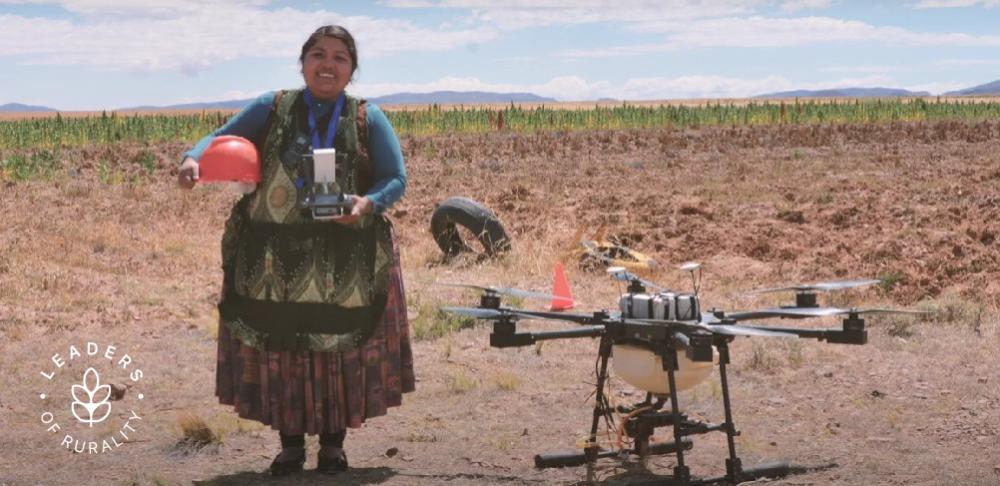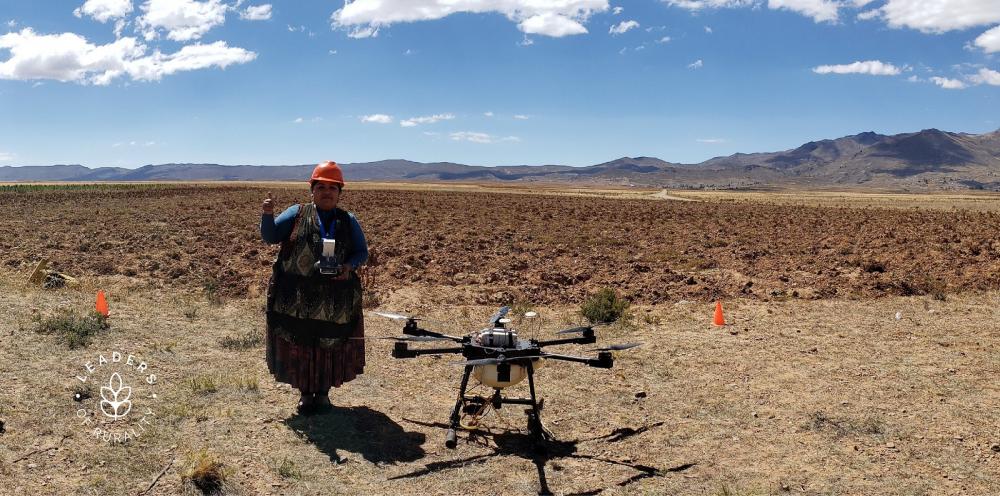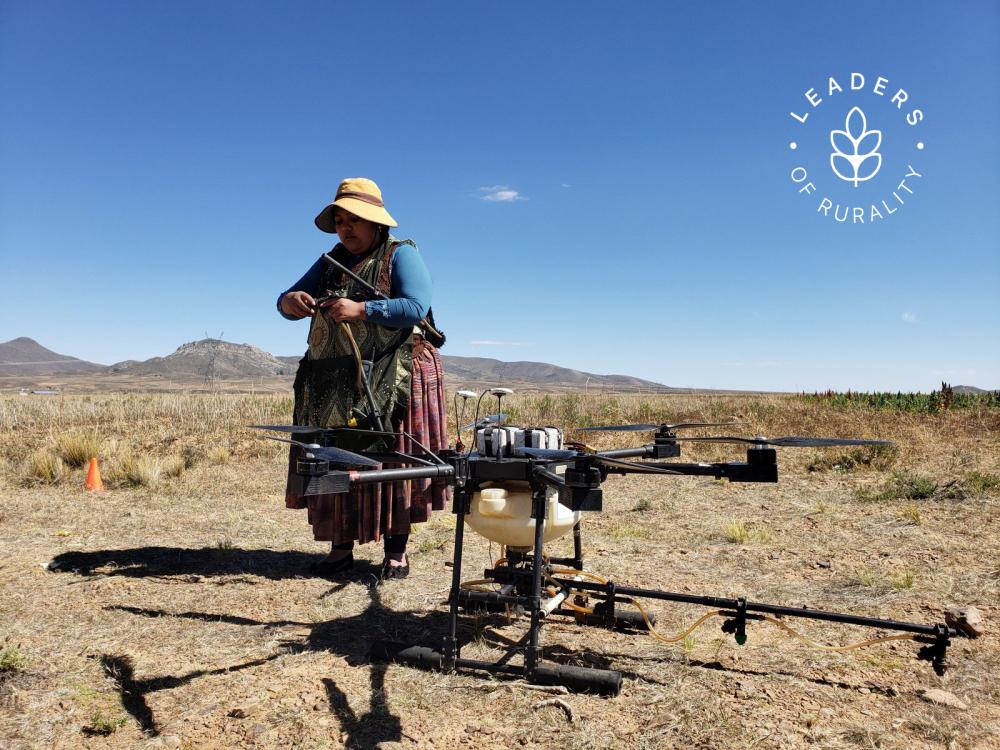Yana grew up in Villa Puni, a small community in the department of La Paz, on the shores of Lake Titicaca and more than 3800 meters above sea level. Most of the people who live there engage in fishing and the production of crops such as potatoes, quinoa, broad beans and barley, despite having to contend with the poor quality of soils in the area.

La Paz, September 14, 2023 (IICA). The Inter-American Institute for Cooperation on Agriculture (IICA) has recognized agronomist Yessica Yana as a “Leader of Rurality” of the Americas. She is the first woman member of the Aymara indigenous people to operate a drone that makes it possible to increase agricultural yields and make more efficient use of water in the Bolivian Altiplano.
In recognition of her achievements, Yana will receive the “Soul of Rurality” award, an initiative of the agency specializing in agricultural and rural development designed to honor individuals who are leaving a mark and making a difference in the rural communities of the Americas, a key region for food and nutrition security and the planet’s environmental sustainability.
Yana grew up in Villa Puni, a small community in the department of La Paz, on the shores of Lake Titicaca and more than 3800 meters above sea level. Most of the people who live there engage in fishing and the production of crops such as potatoes, quinoa, broad beans and barley, despite having to contend with the poor quality of soils in the area.
Having fallen in love with the countryside and agriculture at an early age, and keen to help her community achieve better living conditions, Yana studied agronomy at the Universidad Pública de El Alto (UPEA).
After graduating, she did a professional internship with a company that introduced her to the drones used to spray crops with fertilizers, herbicides and other inputs made from natural products.
“The work can be done much more quickly with a drone than with traditional spraying, which is carried out using backpacks. It saves time, especially for women, who are usually the ones in charge of the crops, but also have to take care of the children. Water is scarce in the Altiplano, but this method also uses only half the amount,” Yessica says.

She has piloted the drone on numerous small farms in the Bolivian Altiplano, thanks to a project implemented by Swisscontact, an independent foundation funded with Swiss private capital. The initiative aims to promote an inclusive digital world, in which innovation and technology help reduce gender gaps and contribute to greater equality and the empowerment of women and girls.
The Leaders of Rurality Award recognizes people who play a unique dual role: that of guarantors of food and nutritional security and guardians of the planet’s biodiversity through production in any circumstances. The award also highlights positive examples for the region’s rural areas.
A woman who didn’t set limits for herself
“As far back as I can remember, I fished on Lake Titicaca with my grandmother. We used to catch lots of fish, but now there are much fewer. Years ago you could fish from the shore, but today you have to fish farther out in the lake. That is a constant concern, as are the poor agricultural yields. I always helped my parents plant crops. As I love living in my community, I wanted to study agronomy. And my dad told me since I was little that just because I was a woman it didn’t mean I didn’t have to study. That I didn’t have to set limits for myself. So I set myself the challenge and entered university,” Yessica explains.
After graduating as an agronomist, she was offered the chance to learn how to operate drones. It sounded interesting, so she accepted, although she didn’t really know what to expect. “They told me that with the drone I was going to travel all over the Altiplano, from north to south. But I was thinking of the small drones used to take photos. I didn’t know that the sprinkler drones used in agriculture are much bigger. Nor was I aware of the big benefits they offer, saving time and water. Over time I’ve learned to control my nerves and I’ve gotten used to operating the drone.”
Her work with new technologies motivated Yessica to also work for the empowerment of rural women in the Bolivian Altiplano, where women have often faced obstacles to their personal development and growth.

“In rural areas, women are always the ones responsible for their families’ well-being. They also have to take care of the crops, because the men go to the cities to find work. So everything is more difficult for women, and now we’re trying to train them in areas such as money management, business, animal health care, and various things they want to learn about. But above all we try to help women overcome their shyness. Many are afraid to speak and practically ask their husbands’ permission to express an opinion,” she says.
To spread the use of new technologies in agriculture, Yessica appeals to young people as allies: “In rural areas, many women are not aware of the benefits of Internet connectivity for farming activities. That’s why we try to get young people to teach their mums. The kids say that, just as they go to school to learn, they can teach their mums things they don’t know.”
Yessica believes that women can play a leading role in the transformations taking place in agriculture with the help of technology and innovation.
“Sometimes out of fear, we miss out on things that are very interesting,” she comments. “That’s why I want women to have the courage to do things. Technology in agriculture is important and it isn’t that difficult. To those who want to study, I’d say it’s never too late to start. I never imagined I’d study agronomy, much less that I’d operate a drone. It’s only natural to feel a little afraid, but we women can do anything we put our mind to.”
More information:
Institutional Communication Division.
comunicacion.institucional@iica.int
Photo Gallery











